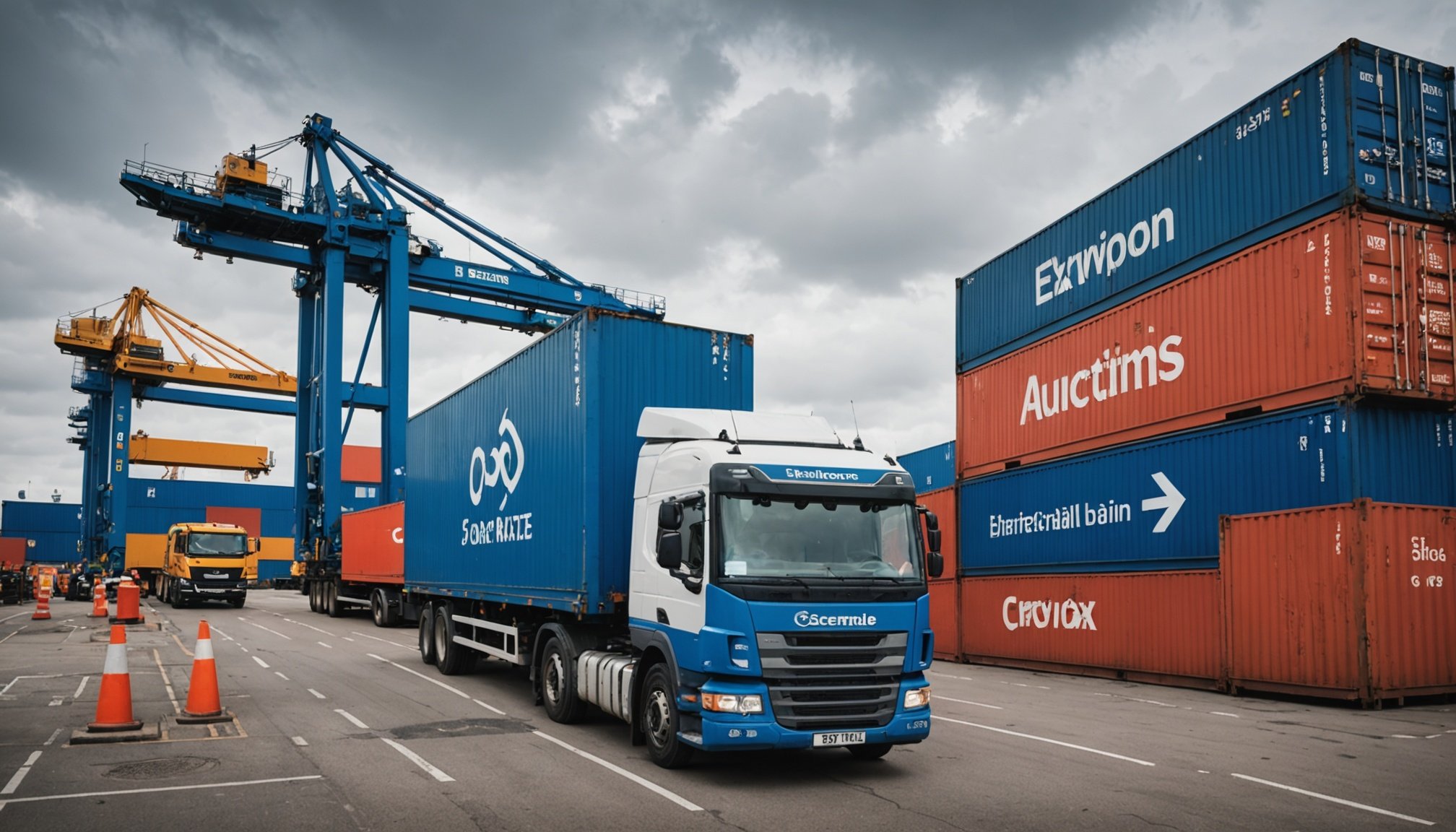Understanding Supply Chain Resilience
Supply chain resilience is fundamental to maintaining business continuity, especially in the rapidly evolving UK context. It refers to the capacity of a supply chain to anticipate, prepare for, respond to, and recover from various disruptions while maintaining operations. This resilience ensures that companies can swiftly adjust to adverse conditions, safeguarding against potential losses and maximizing efficiency.
In the UK, recent disruptions have significantly highlighted the importance of robust supply chain systems. Events such as Brexit, the COVID-19 pandemic, and geopolitical tensions have exacerbated vulnerabilities, creating unprecedented challenges. The UK context presents unique pressures including border delays, regulatory changes, and workforce shortages. These disruptions necessitate a greater emphasis on developing adaptable and flexible supply chain strategies.
This might interest you : Essential credit risk management techniques for uk financial institutions: top strategies for success
Current trends impacting UK supply chains include the adoption of digital technologies for enhanced supply chain visibility and the prioritization of sustainability efforts. Companies are increasingly using data analytics and Internet of Things (IoT) devices to improve their ability to predict and respond to disruptions effectively. Nonetheless, challenges persist, such as maintaining cost-efficiency while integrating these advanced technologies.
Understanding these dynamics is crucial for companies seeking to navigate the complex landscape of UK supply chains and ensure long-term resilience against future disruptions.
Also to see : Innovating energy efficiency with vallourec smart tubular solutions
Key Factors Affecting Supply Chain Resilience
In today’s interconnected world, economic factors play a crucial role in determining supply chain resilience. Rapid shifts in the global economy, such as fluctuations in currency exchange rates or sudden changes in commodity prices, can dramatically affect supply chains. For instance, an unexpected spike in oil prices can increase transportation costs, leading to a ripple effect across the entire supply chain.
Meanwhile, political stability is another critical factor. Political decisions, regulations, and even geopolitical tensions can disrupt supply operations. For example, a change in trade policies, like tariffs or import/export restrictions, might necessitate businesses to restructure their supply chain strategies to remain compliant and competitive. Moreover, political unrest or instability in regions where supply chain activities are concentrated can lead to delays and increased operational costs.
Lastly, environmental challenges demand attention in the pursuit of sustainable supply chains. Climate change and natural disasters pose significant threats, often causing unexpected disruptions. Furthermore, there’s an increasing emphasis on sustainability, which businesses must incorporate into their supply chain practices. This includes reducing carbon footprints, promoting ethical sourcing, and aligning with environmental regulations, thereby ensuring a resilient and sustainable supply chain strategy.
Strategies for Immediate Disruption Management
In the rapidly evolving landscape of modern business, tactical response strategies serve as the cornerstone for addressing sudden disruptions effectively. These strategies allow companies to navigate unforeseen challenges with agility and precision, ensuring the continuation of operations despite unexpected events.
A robust crisis management plan is paramount for any supply chain network. By having a well-structured plan in place, companies can prepare for potential crises, ensuring that they are not only reactive but also proactive in their approach. This preparation includes identifying potential risks, creating response protocols, and training staff to execute these protocols efficiently.
Real-world examples abound where organizations have successfully tackled disruptions through effective crisis management. For instance, during the global semiconductor shortage, numerous tech companies employed short-term strategies such as diversifying suppliers and increasing inventory levels to mitigate delays and maintain production. Another example is seen in the retail sector, where businesses employed tactical responses by leveraging local suppliers to counteract global logistics challenges during the pandemic.
Ultimately, these examples demonstrate that having a systematic, tactical response system is not just beneficial but essential. By embedding such strategies into the corporate framework, companies position themselves to withstand and thrive during crises, transforming potential threats into opportunities for growth and improvement.
Long-Term Supply Chain Resilience Tactics
Building strong supplier relationships and exercising flexibility are pivotal components in cultivating long-term supply chain resilience. The foundation of any robust supply network rests upon mutual trust and dependability, which can be achieved by fostering open lines of communication and periodically reviewing performance expectations. Flexible contracts that allow for adjustments mitigate risks associated with unforeseen disruptions, ensuring continued operations.
Investing in technology and data analytics for predictive insights represents another effective strategy for risk management. Advanced technological solutions can anticipate potential threats by analyzing vast amounts of data, thereby enabling supply chain managers to act proactively. This foresight not only prevents possible interruptions but also optimizes operational efficiency through improved decision-making.
Furthermore, developing contingency plans and robust risk management frameworks is vital for resilient supply chain operations. These plans must encompass various scenarios and outline clear action steps, ensuring that the supply chain can swiftly adapt to changes or disruptions. Implementation should include regular drills and revisions, maintaining the relevance and efficacy of the plans.
Incorporating these proactive measures ensures that operations remain streamlined, cost-effective, and adaptable to changing circumstances. By embedding these long-term strategies into the supply chain framework, organizations can weather challenges and build a sustainable competitive advantage.
Case Studies of Resilient UK Supply Chains
In exploring case studies of UK companies, we observe how they successfully navigated disruptions with remarkable resilience. These real-world examples provide valuable lessons learned that can serve other industries facing similar challenges.
One standout company implemented a multi-supplier strategy, ensuring availability from different regions. By diversifying suppliers, they mitigated risks associated with singular dependency, proving the efficacy of supply chain flexibility in uncertain times. Such an approach can provide a blueprint for others aiming to enhance their operational robustness.
Another leading firm invested in local production capabilities. This move not only reduced potential delays from international shipping but also promoted environmental sustainability. Reducing reliance on overseas manufacturing can be a crucial step many UK companies consider, offering a dual benefit of operational efficiency and ecological responsibility.
Moreover, adopting best practices like leveraging digital tools for real-time tracking and alerts can provide substantial strategic advantages. Companies that streamlined their operations through digital platforms managed to maintain service levels during crises, demonstrating the critical role of technology in modern supply chain management.
These case studies underscore the importance of strategic foresight, flexibility, and innovation, offering a roadmap for resilience that other industries can draw inspiration from to fortify their own supply chains.
Expert Insights on Future Supply Chain Trends
The future of supply chain management is a captivating topic, brimming with insights from industry experts. With future trends leaning heavily towards digital transformation, many supply chain specialists believe that the integration of advanced technologies like artificial intelligence and blockchain will be paramount in addressing future challenges. These technologies are expected to enhance transparency and efficiency, critical elements as businesses aim to streamline their operations.
In the UK, supply chain innovation is highlighted through the adoption of automation and real-time data analytics. Experts point out that these innovations will allow companies to better predict demand and respond promptly to market changes, ultimately bolstering their competitive edge.
Moreover, resilience strategies are being reshaped by exploring innovations such as circular economy practices. By rethinking production and consumption patterns, businesses can create more sustainable and resilient supply chains. Experts stress the importance of developing multi-tiered supplier relationships to mitigate risks associated with single-source dependencies.
It is clear from the expert opinions that supply chains are transitioning towards more agile and interconnected models. By embracing these emerging trends, businesses can prepare themselves for an evolving landscape, ensuring they remain resilient and adaptable in the face of future uncertainties.
Practical Recommendations for Businesses
Implementing resilience strategies within organisations can be a complex task, but following actionable steps can simplify the process. Start by conducting a thorough assessment of your current supply chain operations to identify vulnerabilities. This forms a baseline for developing targeted improvements.
Step-by-step guide for enhanced resilience includes diversifying your supplier base, which helps mitigate risks associated with over-reliance on a single supplier. Additionally, investing in technology such as supply chain management software facilitates real-time monitoring and predictive analytics, empowering organisations to make data-driven decisions.
When implementing these strategies, common pitfalls include inadequate resource allocation and resistance to change. Businesses should ensure they have the appropriate resources and buy-in from all stakeholders to drive effective change.
Various resources and tools are available for UK businesses to leverage. The government offers support through funding and informative hubs that provide guidance on best practices. Also, numerous third-party applications and platforms can optimise supply chain dynamics, offering tailored solutions to specific needs.
Avoiding pitfalls and implementing these steps will significantly enhance the robustness of your business operations. By taking these strategic actions, companies can proactively secure their supply chains against future disruptions, ensuring continuity and stability.











